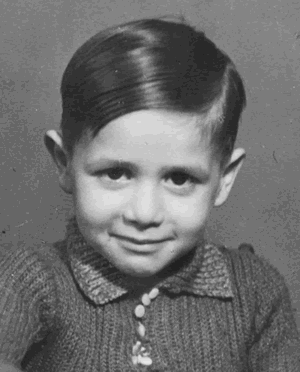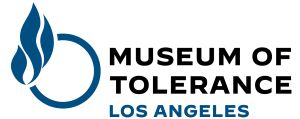
Peter was born in Berlin, Germany in July 1936, after the Nuremberg Laws had been passed, taking away all civil rights of German Jews. Peter was not allowed to attend public school, play in parks or playgrounds, visit any movies or other forms of entertainment, ride any buses or trains, own any pets, and he had to wear a yellow star on his clothing whenever he went outside.
Peter's father had disappeared, so Peter lived alone with his mother. From the time Peter was about four years old, his mother had to leave him by himself all day during the week while she went to work in a German uniform factory. On his own, he followed his mother's instructions about what to study, when to play, and when to nap.
In June 1943, the Nazi Gestapo arrested Peter and his mother and deported them, together with about 150 other Berlin Jews, to the Terezin concentration camp (Theresienstadt) in Czechoslovakia. After 2 days and nights without food or water in a cattle car, Peter along with his mother and others, arrived at Terezin. Peter was placed in the children's section where he remained for two years. His mother was sent to the adult section of the camp where she was put to work at various jobs. Peter and his mother were able to visit each other every other month for about an hour. About three weeks after Peter arrived at Terezin, he had his seventh birthday. Peter and other children his age were put to work gathering mica rocks from a section of the camp, loading boxes on trains, and tending to the camp vegetable field which fed only the camp guards and administrators. Peter and the other inmates had a daily ration of a bowl of soup, and occasionally a small potato or piece of bread.
Terezin was built for about 5,000 people, yet nearly 80,000 Jews were held there at any one time. A total of 140,000 Jews, including 15,000 children, were sent to Terezin between November 1941 and early 1945. Of that total, 87,000 Jews were transported to Auschwitz and more than 33,000 died in Terezin from starvation, disease, or execution.
Terezin was liberated on May 8, 1945 by the Soviet Army. Of the 15,000 children who passed through Terezin, only about 125 survived. Peter was one of the lucky ones who survived. Peter's mother also survived. After two years in a Displaced Person's camp in Germany, Peter and his mother, new father, and baby sister arrived in America to start a new life. At age 11, Peter was able to attend school for the first time.
Peter is now known as Peter Daniels, and he lives in Los Angeles, California. He is a Museum Guide at the Museum of Tolerance.

